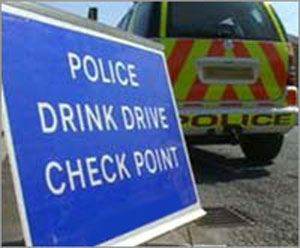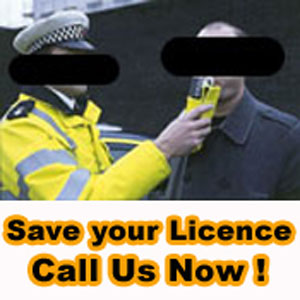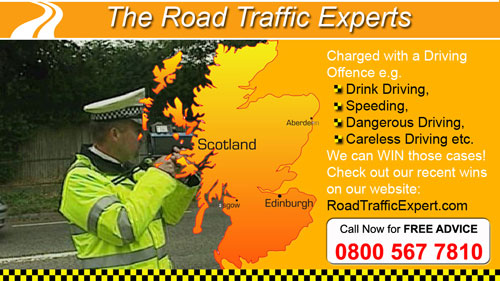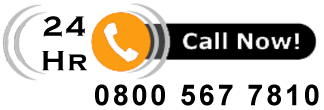Over 95% Win Rate!
We win Drink Driving Cases.
Charged with Drink Driving?

Do you need to speak to an specialist drink driving lawyer? It may be VITAL to your case that you contact us immediately. Do not delay, as time may be crucial. Dial 0800 567 7810 . Helpline open 24Hrs / Day and speak to our Specialist Drink Driving Solicitor about your problem. We offer FREE LEGAL ADVICE and even the telephone call is FREE. Your call will be with Richard Freeman.
To be convicted of a charge of drink driving the prosecution must prove that at the time you were driving you had excess alcohol in your blood, urine or breath.
Drink Driving Alcohol Limits:
The limits which apply to all drink driving cases are as follows:
(a) 22 microgrammes of alcohol in 100 ml of breath
(Before 5/12/14: 35 microgrammes of alcohol in 100 ml of breath)
(b) 50 milligrammes of alcohol in 100 ml of blood
(Before 5/12/14: 80 milligrammes of alcohol in 100 ml of blood)
(c) 67 milligrammes of alcohol in 100 ml of urine.
(Before 5/12/14: 107 milligrammes of alcohol in 100 ml of urine)
Drink Driving Penalties:
The law in relation to drink driving is immensely complex and the penalties for being guilty of drink driving are severe. A drink driver will face mandatory disqualification for a period of at least twelve months and it is also open to the courts to impose a significant financial penalty, a period of community service or even a prison sentence of up to six months.
In addition, where a driver appearing on a charge of drink driving has a conviction for a previous alcohol related offence within the last ten years then the minimum period of disqualification rises to three years.
One way to avoid these penalties for drink driving may be to argue that ‘special reasons’ apply which justify lessening their severity by avoiding a disqualification altogether. However, it should be borne in mind that establishing special reasons for drink driving can be a very difficult task. You should speak to one of our specialists who can advise you of your prospects and the best strategy to use in the specific circumstances of your case.
Richard Freeman (AKA Mr. Technicality) is one of Scotland's most prominent Solicitor Advocates with the skills, decades of experience and technical expertise to vigorously defend your position. His success rate when defending drink driving charges is independently reviewed as excellent!
 Do not delay, time is vital in order for us to properly examine the evidence against you, contact potential witnesses, ensure timelines are consistent with the evidence and investigate many other aspects in order to create your strongest legal defence.
Do not delay, time is vital in order for us to properly examine the evidence against you, contact potential witnesses, ensure timelines are consistent with the evidence and investigate many other aspects in order to create your strongest legal defence.
Call our FREE national helpline 0800 567 7810 now or our local numbers. Alternatively, complete a contact form.

Drink Driving Breath Test
There are two stages where breath tests can be required by the police:
1) The Preliminary Breath Test:
 A prosecution for drink driving will usually commence with a driver being stopped by a police officer by the roadside. Provided that the officer in question is in uniform and has a reasonable suspicion that the driver has been driving whilst under the influence of alcohol then that officer is entitled to require that the driver provides a roadside alcohol breath test to ascertain if a drink driving offence has been committed.
A prosecution for drink driving will usually commence with a driver being stopped by a police officer by the roadside. Provided that the officer in question is in uniform and has a reasonable suspicion that the driver has been driving whilst under the influence of alcohol then that officer is entitled to require that the driver provides a roadside alcohol breath test to ascertain if a drink driving offence has been committed.
The police will also receive a report from a concerned citizen (such as another motorist, neighbour, publican, or spouse) about a possible drink driver but by the time the suspect is located he or she is back home. The police are still entitled to enter the premises and require the suspect to provide a preliminary breath test.
The police use two types of devices. Both are Home Office approved and are hand held devices, used for indicative purposes only. The older model simply indicates a pass or fail, the other, a more modern device, will give an actual reading which is considered accurate enough to determine if the suspect is over the prescribed limit. It is not however admissible as evidence to prove someone is above the limit for court purposes. New legislation however, permits a police officer to skip the preliminary breath test altogether, and instead take the suspect straight to a police station to carry out what is known as the evidential breath test procedure.
A failure to provide the preliminary breath test whether at the road side or elsewhere, without a reasonable excuse, amounts to an offence, and upon conviction a court can impose 4 penalty points or an unlimited period of disqualification. If you have a reasonable excuse in law this will amount to an absolute defence. A reasonable excuse can be an inability to provide the sample on medical grounds. A refusal to provide a sample because you have taken drink after driving, or because you want to speak to a solicitor first are not reasonable excuses, nor is the fact that the police have taken a lengthy period of time to trace you after you have stopped driving.
2) The Evidential Breath Test:
If the driver thereafter fails the preliminary breath test, or the police officer decides not to make such a requirement, the constable has the power to arrest the driver and convey them to the nearest police office so that more in-depth testing of the level of alcohol in the drivers system can take place.
Upon arrival at a police office the alleged drink driver will be asked to provide a specimen of breath on an intoximeter machine which has the ability to measure the level of alcohol in a driver’s breath.
Failure to provide a sample at this stage without reasonable excuse is an offence punishable on conviction in an identical manner to drink driving itself.
In certain limited circumstances it is possible for the police to take samples of blood or urine from a driver instead of or in addition to samples of breath.
So where, for example, a constable has reasonable grounds for believing that an intoximeter machine is not working in a reliable fashion and no other intoximeter machine is available for use within the police station then the officer can request that the driver provides a specimen of blood or urine.
Drink Driving Blood and Urine Test:
The constable is entitled to choose whether the sample given is that of blood or urine and again failure to provide a sample at this stage without reasonable excuse is an offence punishable on conviction in an identical manner to drink driving.
Moreover, in circumstances where the reading given on an intoximeter machine shows that a driver has less than 50 microgrammes of alcohol in 100 ml of breath then the police are legally obliged to offer the driver the opportunity of replacing his or her sample with a sample of blood or urine. It must be stressed that the decision whether or not to accept such an alternative sample is one which should be made by the driver alone. If the court accepts that police officers attempted to persuade the driver not to accept such a sample then conviction cannot follow.
Where a sample of blood or urine is provided then the alleged drink driver should always be given the option of taking a quantity of that sample away for independent analysis to test the alcohol levels. We would strongly recommend that this option is seized upon. Drink driving penalties are severe and thus there is nothing to be lost by having such samples analysed by an independent laboratory which could, theoretically speaking, come up with findings vastly different from the police laboratory. We are more than happy to provide you with the details of independent laboratories that carry out this sort of analysis on behalf of drivers being accused of drink driving. Bear in mind however that if you decide to have such samples analysed then you should move quickly as the quality of such samples diminishes quickly with time and could adversly affect your opportunity to challenge the drink driving charge..
Drink Driving 'Post Incident' Defence:
Those charged with drink driving, drunk in charge and offences of this sort should bear in mind that it may, in certain circumstances, be possible to utilise a defence of ‘post incident drinking'. This defence can arise where a person suspected of drink driving is not dealt with until after the drink driving is alleged to have taken place. In such circumstances it will normally be presumed that the level of alcohol in the drivers’ breath, blood or urine at the time when the sample is ultimately taken is at least the same as the level of alcohol in their system at the time the alleged drink driving is meant to have taken place.
So, for example, if the police receive a tip off that an individual is drink driving in Sauchiehall Street in Glasgow at approximately 2am in the morning and their investigations lead them to that individuals flat at 3am where he is detained and later found to have 55 microgrammes of alcohol in 100 ml of blood then the presumption of drink driving will operate. It will open for a judge to presume that when the individual was driving in Sauchiehall Street at 2am he had at least 55 micogrammes in his breath and thus guilty of drink driving.
A defence is nevertheless open to such an individual if they are able to establish on the balance of probabilities that the alcohol reading given by them is attributable to the consumption of alcohol after they finished driving. However, it should be borne in mind that advancing such a defence is a highly complicated affair which will often entail the leading of evidence from a forensic toxicologist who will be required to speak to the reading which he or she would expect to be produced if a person of the height and weight of the driver in question consumed the amount of alcohol they claim they had prior to the police arriving.
It must be appreciated that the information given above is but a brief summary of the legal provisions relating to drink driving offences. As previously stated, the law in relation to drink driving and such offences is highly technically complex and anyone charged with drink driving or an offence of this nature should seek expert legal advice at an early stage.
Do not assume that just because you have been caught drink driving, conviction will inevitable follow. The experience of our legal team in both prosecuting and defending drink driving and similar charges of this nature is that police officers can, and do make mistakes in working their way through the complicated legal rules and procedures that apply to these cases.
Drink Driving Rehabilitation Course:
Even if you are convicted of drink driving or an alcohol related charge of this nature it is possible to reduce your period of disqualification through participation on a ‘drink driver’s rehabilitation course’. If the presiding judge agrees to place you on drink drivers course and the drink drivers course is satisfactorily completed then your period of disqualification can be reduced by up to a third.
Here is an example of how we won an 'impossible' Drink Driving case. This was actually reported in The DAILY RECORD Newspaper
"Teacher spared jail after being caught drink-driving for a third time"
Click HERE to read how Richard Freeman from the Road Traffic Experts defended and won what other lawyers would have thought an impossible case.
Click on links below to view results of our recent Drink Driving Cases:
- Drink Driving Charge: We got the case Dropped!
- Drink Driving 2.5x limit. Used Court process to get case dismissed!
- Drink Driving 3x limit. Argued a technical Flaw, client acquitted!
- Drink Driving & Failure to Provide a Breath & a Blood Specimen. We get Not Guilty for 2 charges! & negotiate just 4pts & fine for 3rd charge!
- We find a technicality related to the Intoximeter procedure, client found Not Guilty!
- (2X limit): Another solicitor advised client to plead guilty but he came to us and we get the Case Dismissed!
- Witnesses state they saw our client very drunk and driving. We argue admissability of evidence and win a Not Guilty!
- Failed Breathalyser test but we are able to use toxicologist expert evidence to have the case dropped.
- Failed breathalyser three times and facing mandatory ban. We find a technical issue and win a Not Guilty!
- Drink Driving, Failing to Stop After an Accident. We find a technical issue and win Not Guilty! to both charges
- Drink Driving charge. We find a procedural irregularity and client is acquitted!
- Client facing driving ban and has a witness willing to testify against him. We argue on evidence and win a Not Guilty verdict!
- 3rd Offence and facing very lengthy driving ban, however Richard Freeman gets charges dropped!
- In court for Drink Driving, we use a technical point and Win a 'No Case to Answer'!!
- Employer and Employee Facing Mandatory ban We save both licences!
- Car Collided with Council property, Failed Breathalyser. We find technical issues and win a Not Guilty!
- Despite facing a substanial ban with multiple charges We get crown to reduce charges and client just gets points!
- Client crashes car, alcohol well level above legal limit. We get her off on a technicality!
- Crashed car while drunk but special circumstances involved. Crown want to prosecute, but we highlight our 'necessity' defence and persuade fiscal to dop the case!
- Found a technical procedural error by police and had the case dropped before trial!
- Facing Disqualification. Police state client drove into oncoming traffic almost crashing into them. We find evidential anomalies and case gets dropped!
- Accused of Drink driving and hitting car. We gather contrary evidence and get a Not guilty plea accepted by the Crown on the day of trial!
- 6 times Drink Drive limit, car seized for forfeiture and facing a long ban. Client wanted to plead guilty but not lose car. We negotiate hard and save car and reduce ban!
- Client facing a ban and desperate to save licence. We find evidential difficulties with Fiscal's case and so negotiate strongly to a lessor charge. Ban avoided!
- Client facing 2 serious charges and being disqualified. We still win a Not Guilty on both counts, despite the evidence from 6 police officers!
- Client allegedly 4 times the legal limit! Client also admitted driving the car and has cctv against him. We scrutinize evidence, find a technicality and win a Not Guilty!
- Client facing disqualification. Crown feels it has solid case, but we find technicalties in evidence. We vehemently oppose their motion to adjourn and then win a Not Guilty!
- Client allegedly crashed car while twice the legal limit. We get case dropped on a technicality. Client delighted!
- Taxi driver facing ban and loss of livelihood. We find technical issues and win a Not Guilty!
- 7 times over the legal limit and facing the maximum ban. We manage to persuade the court to impose the minimum ban.
- We win not guilty to drink driving, and dangerous driving reduced to careless driving - client walks away with just 6 penalty points and £500 fine.
- Plea of not guilty accepted to dangerous driving and pled guilty to his 4th drink driving conviction - while over 5 times the drink driving limit - client spared a jail sentence.
- Client failed blood test, but we argue its admissiablity show that due process was not followed. We win a Not Guilty verdict.
- The Crown after tenacious negotiations accepted a plea to 'Drunk in Charge' and instead of receiving a mandatory minimum 12 month ban he received 10 points. Client delighted to have kept his driving licence!
- Client facing drink driving ban. We defend with a post incident drinking argument and win a Not Guilty!
- Client facing being disqualified from driving, fails breathalyzer. We find technical issues with police procedure and win a Not Guilty verdict!
- A seemingly open and shut case however we fight in court against the circumstantial evidence and client is found Not Guilty on all charges!
- Client advised by other solicitors to plead guilty. However, we advise to test the prosecution at trial and during our cross examination of the police officers, find weaknesses. Result: Not Guilty on both charges!
- Client fails breathalyzer test and showed just over the limit. We build a case to refute reading and on day of trial, vehemently oppose prosecutor requesting adjournment as we are prepared for case, but their police officer is ill and cannot attend. We get case dropped!
- Client faces loses driving licence. Other solicitor said he had no defence. We dig deep and find a minor procedural technicality! On day of trial we present Fiscal with the technicality and he admits the point. Fiscal then accepts 'Not Guilty' plea. Client delighted!
- Client failed Roadside breath test, we investigate and find a legal technicality to use as a defence and persuade fiscal to drop the case. Client delighted.
- Client faces disqualification. Seemingly a "no hope" case for several reasons. However, we robustly cross-examine witness and provide legal arguments persuading court on several points. Client found Not Guilty!
- 3 times over the limit! We find a precedural technicality and fervently argue the point. We win a Not Guilty verdict and client's licence is saved!
- Client failed breathalyser at roadside and failed further specimens, therefore facing 12 month ban. However, Richard Freeman aka 'Mr. Technicality' was able to find an unusual technicality which resulted in client being acquitted.
- Found almost 4 times the legal limit, in accident damaged up car and facing mandatory loss of driving licence. We find evidential difficulties for the Crown and case is resolved on day of trial to a lesser charge of being drunk in charge of his vehicle, and licence is saved with some penalty points imposed.
- Client captured on video acting drunk, client refuses preliminary breathalyser, then fails breathalyser test after arrest. We argue our defence and Fiscal can't prove case. Case deserted and client delighted.
- Failed breathalyser after a car accident. We get an expert toxicologist to provide evidence the alcohol was drank after the accident and win a Not Guilty verdict!
- Client was just over the drink drive limit and faces a mandatory driving disqualification. Richard Freeman a.k.a. Mr. Technicality finds a technicality which proves fatal to the prosecution case. Client found Not Guilty.
- Client facing a driving ban with clear video evidence and witnesses against him. However we scrutinize the evidence in great detail and find a legal technicality we strategically use in court and win a Not Guilty verdict!
- Client had been banned for 12 months and fined. We take the case to appeal, show technical flaws in police procedure and win the appeal. Client ecstatic!
- Charged with 3 times the legal limit and facing mandatory ban. We find a technicality and get charges reduced to Drunk in Charge and then negotiate just penalty points instead of a ban. Client was delighted to save his licence!
- At trial diet Crown accept not guilty plea to drink driving after demonstrating a fatal legal technicality. Client pleads Guilty to careless driving and 6 points imposed by the court. Licence intact.
- Client allegedly 4 times the legal limit. However Richard Freeman finds a legal Technicality and wins the case. Client found not guilty!
- Client fails 3 breath tests and faces losing her driving licence. We hire an expert toxicologist and tenaciously argue a post incident drinking defence and win. Client ecstatic!
- Client failed breathalyser 3 times. However, we fervently argue that the police delayed breathalysing our client and this may have actually increased his alcohol levels. Case dismissed much to our client's delight.
- Client crashes car, then found 3x legal alcohol limit and pleads guilty thus facing mandatory disqualification. We advise client to change plea to 'not guilty' then win his case on a fatal technicality. Client delighted!
- Client facing a mandatory driving disqualification. However, after rigorous checking of all the evidence we find and argue over a weakness in the crown case and our client is found not guilty!
- Client fails breath test at 4 times legal limit. Richard Freeman aka Mr. Technicality finds a small but effective technicality and the Crown concedes defeat and client escapes all charges.
- Client admits she has taken a drug to police and faces a 12 month driving ban, however we exploit a legal technicality and case is dropped!
- Client has CCTV footage of him driving and several witnesses against him. However, we go over evidence in minute detail and the police actions. We find technical arguments to use and argue fervently at court resulting in being found Not Guilty on all charges!
- Despite client allegedly admitting guilt to witnesses and CCTV evidence, we are able to show that the legal test had not been met and save her license!
We Cover All of Scotland

All of Scotland Covered:
Including: Glasgow Edinburgh Aberdeen Dundee Paisley Renfrewshire East Kilbride Perth Livingston Cumbernauld Hamilton
Kirkcaldy Dunfermline Ayr Kinross Kilmarnock Inverness Greenock Inverclyde Port Glasgow
Coatbridge North Lanarkshire Glenrothes fife Airdrie Falkirk Stirling Rutherglen Dumfries Galloway Motherwell Wishaw Clydebank West Dunbartonshire Bearsden East Dunbartonshire Cambuslang Newton Mearns East Renfrewshire Bishopbriggs Musselburgh East Lothian Arbroath Angus Polmont Elgin Renfrew Renfrewshire Alloa Bellshill Clackmannanshire Blantyre Dumbarton West Dunbartonshire Kirkintilloch Clarkston
East Renfrewshire Bathgate West Lothian Stenhousemuir Falkirk Peterhead Aberdeenshire Barrhead
Grangemouth Falkirk St Andrews Fife Kilwinning Ayrshire Giffnock viewpark Buckhaven Penicuik Midlothian Stranraer Johnstone Erskine Larkhall Moray


